Transmission Repair Specialists in West Jordan, Utah
Is your vehicle experiencing transmission troubles? We're transmission repair geniuses! We guarantee we can fix your transmission and get you up and running in no time.
READ MORE -

The importance of a certified auto mechanic when handling your car's issues cannot be overstated. But what do these certifications mean for you as a car owner? Simply put, they directly impact the quality of service you receive, the longevity of your vehicle, and your peace of mind. In this article, we delve into auto mechanic certifications and their significance to you, especially if you're in West Jordan, Utah.
Mechanics can obtain various certifications, each representing expertise in different areas. The ASE (Automotive Service Excellence) certification is one of the most recognized. An ASE-certified mechanic has met high industry standards, guaranteeing a certain level of skill and knowledge.
ASE certification, or Automotive Service Excellence certification, sets the standard in the automotive repair industry. This certification requires mechanics to pass stringent tests demonstrating their knowledge and competence in various automotive repair and service areas. In addition to these exams, mechanics must have relevant hands-on work experience. But earning the certification isn't the end of the journey. To ensure they stay up-to-date with the ever-evolving world of automotive technology, ASE requires mechanics to retake and pass these tests every five years. This commitment to continuous learning ensures ASE certified mechanics provide the highest quality service to vehicle owners.
At Ace Auto Repair, we understand how crucial certifications are. Our team comprises of ASE certified auto mechanics, assuring you of our commitment to excellence.
An ASE-certified mechanic ensures a high standard of service. Their extensive knowledge spans different areas, from general auto mechanics to specialized auto electrical mechanics.
While ASE is widely recognized, other certifications also hold value. These include brand-specific certifications, like BMW or Audi certifications, which reflect expertise in servicing particular car brands.
Certifications are a car owner’s assurance of quality. They represent a mechanic’s commitment to excellence, professionalism, and ongoing learning. By choosing an auto mechanic shop with certified experts, you can expect superior service that gives you the peace of mind you deserve.
Never leave your car's health to chance. Choose an auto repair mechanic with the right certifications. At Ace Auto Repair in West Jordan, Utah, our certified team is ready to deliver top-notch service that meets your needs and exceeds your expectations. Get your free auto repair quote, or schedule an appointment today. And remember to ask about our loyalty program for oil changes to save some money.
Other related articles:
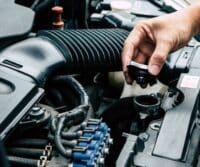
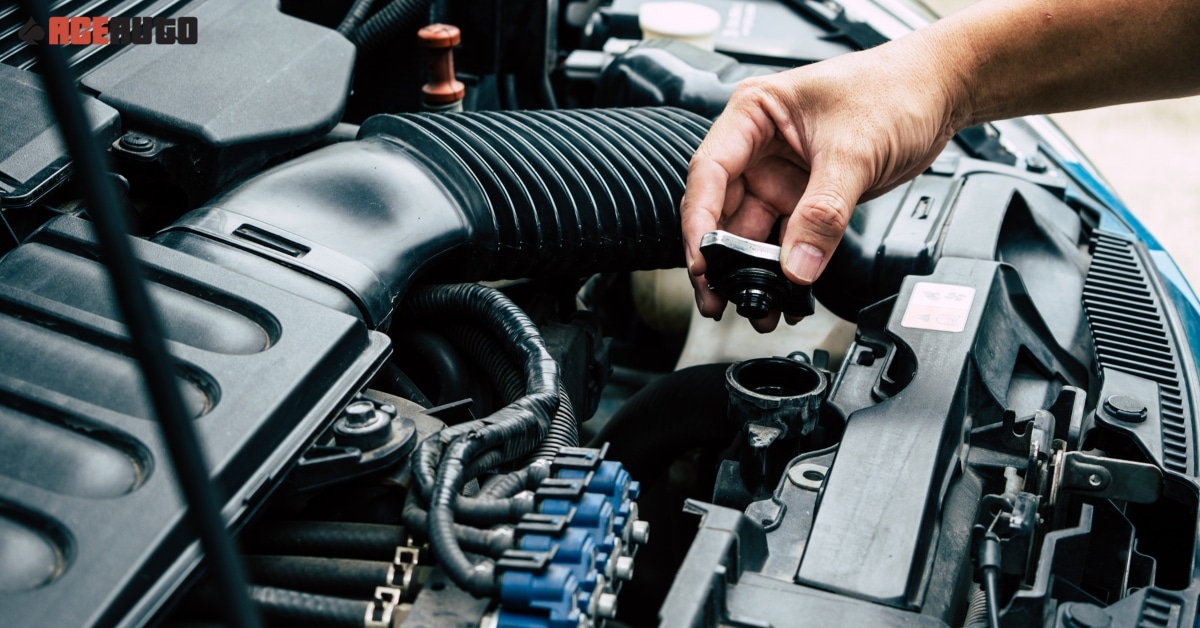
As the winter chill is set to arrive in West Jordan, Utah, it's important to prepare your vehicles for the icy conditions. Radiator flushing, a vital aspect of winter prep, often goes overlooked. But neglecting this critical service can leave you stranded in the cold. Let's dive into the world of the radiator flush service and how Ace Auto Repair can keep your vehicle running smoothly through the frosty season.
The radiator, your vehicle's thermal guardian, plays a crucial role in maintaining the engine's temperature. Its importance becomes even more evident during winter, when maintaining optimal engine heat is critical.
Radiator flushing isn't just about draining coolant. It's a comprehensive cleansing process that helps remove build-up and rust from your radiator. Regular flushing ensures your radiator functions at its peak, crucial for winter when engine heating is vital.
Watch out for symptoms like overheating, discolored coolant, or a low coolant level - these might indicate your vehicle needs a radiator flush. A well-timed radiator flush service can save you from a sudden midwinter breakdown.
At Ace Auto Repair, we offer top-notch radiator flushing services. Our certified mechanics use specially designed radiator flushing fluid to ensure a thorough cleanse. Whether you're driving a car, truck, or SUV, you can trust our team to prepare your vehicle for the Utah winter.
Regular radiator flushing extends your vehicle's lifespan, enhances its performance, and saves you costly repairs. An investment today can save you from a world of winter woes tomorrow.
When it comes to winter preparation, radiator flushing is not a step to be skipped. With a well-maintained radiator, you can face the winter confidently, knowing your vehicle is ready to brave the cold.
If you're a West Jordan, Utah resident and want to ensure your vehicle is winter-ready, contact Ace Auto Repair. Get a repair quote or schedule a radiator flush service without delay. Call us at (801) 803-6016 or visit our contact page. Remember, with Ace Auto Repair, you're not just getting a service; you're securing your vehicle's health for winters to come. Take action today!
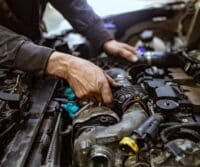
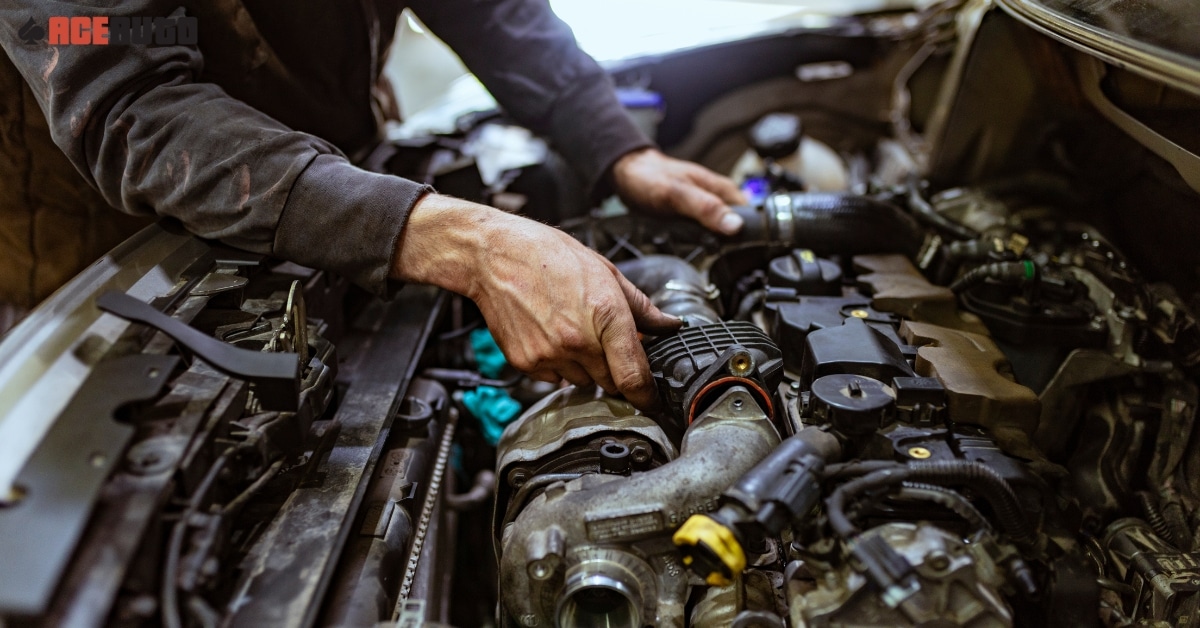
When it comes to car maintenance and repairs, having a reliable automotive mechanic is not a luxury, it's a necessity. A mechanic is someone you entrust with the safety and performance of your vehicle. But with countless auto repair shops out there claiming to be the best, how do you locate a mechanic you can rely on? In this blog post, we'll walk you through the process.
Word of mouth has always been a powerful tool, and in the digital era, it comes in the form of reviews and ratings. Before entrusting your car to a mechanic, take some time to read online reviews. This will give you an understanding of the quality of service provided by the auto repair shops you're considering and help you steer clear of those with a poor reputation.
Professionalism in auto repair is often defined by certifications. An automotive mechanic who invests in obtaining certifications shows a commitment to providing quality service. Look for mechanics who are Automotive Service Excellence (ASE) certified – it's an industry-standard certification showing that the mechanic has demonstrated competence in several areas of auto repair.
Transparency is key when dealing with auto repair shops. Trustworthy mechanics are willing to explain the repair process in a language you can understand and provide a detailed cost estimate upfront. Avoid auto repair shops that are vague about costs or reluctant to explain their work.
Having an automotive mechanic near you can prove to be incredibly convenient, especially in emergency situations. Apart from location, also consider the operational hours and service flexibility of auto repair shops, like whether or not they offer services outside their regular working hours and if they provide any additional perks such as pick-and-drop services.
Finding a trusted automotive mechanic might require some effort and research, but the peace of mind and assurance that your vehicle is in capable hands is worth it. Remember, the best auto repair shops prioritize their customers, providing high-quality service with transparency and professionalism.
Ready to find an auto repair shop that checks all the boxes? Look no further than Ace Auto Repair. Our certified mechanics provide top-notch repair services for all types of vehicles. Whether it’s an oil change or an engine repair, trust us to deliver quality services that keep your car running smoothly.

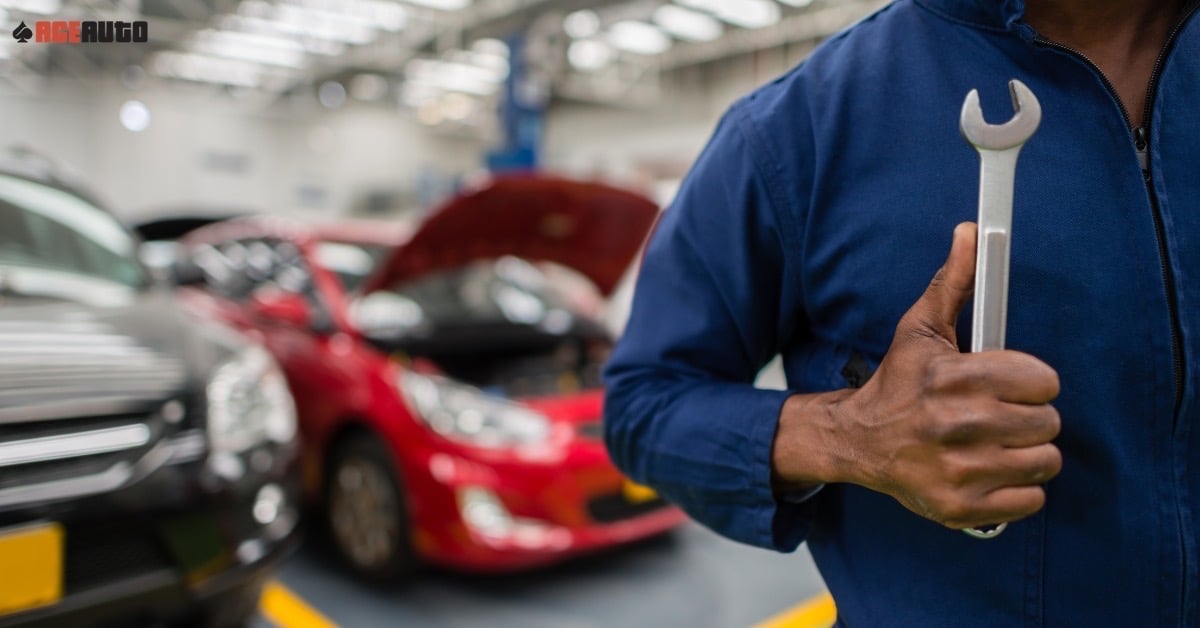
According to Consumer Reports data, customers typically express greater satisfaction with independent auto maintenance and repair shops compared to car dealerships. That’s likely to be largely because the greatest value for your dollar is most often at a high-quality, independent auto maintenance and repair facility. Unless your car’s warranty stipulates the facility where covered repairs must be performed, you are free to have your vehicle serviced wherever you wish. But, which automotive mechanic near you is best?
Auto repairs can be simple, like replacing a thermostat or brake pads. Or, they can be complex, like rebuilding an engine or transmission. Whatever your needs, you naturally want highly skilled and honest car mechanics working on your vehicle. Here are some helpful tips for finding a good, reliable, reasonably priced auto repair shop:
Auto service facilities are among the BBB’s most common generators of customer complaints. So, be sure to do your research at www.bbb.org to learn about shops you should avoid.
Ask for verification that each car mechanic and the repair shop are certified by the National Institute for Automotive Service Excellence (ASE).
Ask what warranties the facility offers on their workmanship and the parts they use. Warranties vary between repair shops, so be sure to ask about the warranty in advance.
Ask people you trust who live in your vicinity for car repair shop recommendations. Be sure to include those who have a vehicle in the same class as yours.
Educate yourself about the local auto shops by visiting their sites and others. Search “mechanic shop near me”, “toyota mechanic near me”, “auto mechanic near me”, “car mechanic near me”, “auto repair shops near me”, “auto repair near me.” Check a few through the BBB, Angie's List, the Mechanics Files at Cartalk.com, Consumer Reports, customer reviews, etc.
You might find shops that you like, but they still may not make the best sense for you because their hours don’t fit your schedule or the location is too far.
Start with a small task like an oil change or replacing spark plugs as an introduction to your new auto repair facility before you use the shop for bigger kinds of auto repairs.
Ace Auto is a family-owned and operated auto repair shop. We are fast, friendly, reasonably priced, and reliable, and we always keep our customers informed throughout the entire process. We do not do any work without their consent. All our mechanics are ASE Certified and maintain continuous training in current high-tech vehicle systems. All our work is guaranteed!
BBB Accredited Businesses - Auto Mechanic Shop
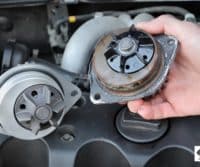
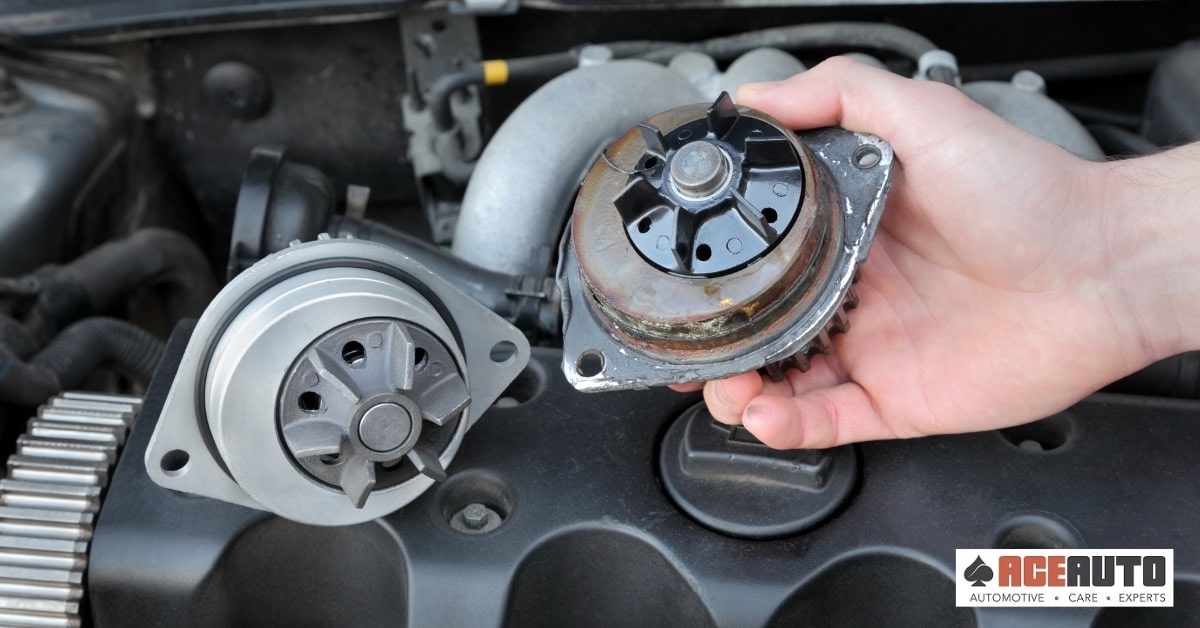
Every vehicle must have a properly functioning water pump in order for the engine to operate. The water pump drives coolant through the radiator and sends it circulating through the engine. When it malfunctions, an immediate water pump car repair becomes necessary to get your vehicle back in drivable condition.
The water pump is responsible for maintaining engine and radiator temperatures within the acceptable range. To keep your car in reliable and safe operating condition, you need to take care of any maintenance matters your water pump requires as need arises.
There are numerous approaches to identifying water pump problems. For example, you may want to listen for unusual sounds coming from the pump, examine the belt and pulley, and check the thermostat. If the water temperature warning light is on, it may indicate that the coolant circulation in your car is insufficient, which may mean you need a water pump replacement. Or, one of a number of other checks may get you closer to discovering a problem with the pump.
Here are some of the most common problems that cause issues with water pumps, to help you in troubleshooting diagnosis of your water pump issue, and in deciding whether you may need automobile water pump repair:
Look for signs of coolant leaking. Check under the front area of your vehicle. Look for any puddling of red, orange, or green fluid. Leaking coolant is often due to issues involving the water pump.
The water pump’s purpose is to circulate coolant in the vehicle’s engine block and heads. When a water pump breaks down, it can no longer circulate engine coolant as it’s designed to do. When the coolant is not circulating as necessary to keep the engine cool, the temperature in the engine rises to an extreme degree, and the engine becomes overheated. An overheated engine is an urgent problem, requiring immediate attention to prevent potentially serious engine damage, including burned-up pistons, and split cylinder heads.
Slow leaks can cause a wet area around the water pump. Check for engine coolant leakage in the area around the pump. Look for rust in the area too. Rust is not uncommon around the water pump when fluid is leaking. Gradual leaks usually don’t cause engine breakdowns very quickly, but they do cause coolant levels to drop. This reduces the amount of lubricant that protects the water pump’s working parts, which are in constant motion while the engine is running, and it promotes wear on the pump.
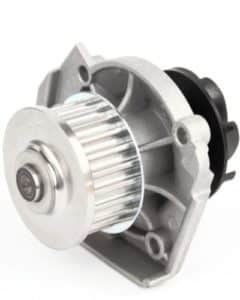
When your water pump is working properly, your engine will maintain a steady temperature range. If you notice steam coming up from your car hood, this indicates that your engine is extremely overheated due to insufficient coolant circulation and needs emergency attention. Turn off your engine immediately when you see steam coming from the engine. Do not ignore the problem, and don’t try to continue driving the car any farther toward your destination, even if it’s just a short distance. Allowing the vehicle to keep running can cause the need for engine rebuilding or replacement. Driving with an engine that is extremely overheated is also very dangerous.
A number of things can cause a belt to become loose. If your engine is making a loud squeaking noise, this may indicate a loose belt on the pulley that drives the water pump. Check to ensure that the water pump belt fits snugly in its proper position. Have a loose water pump belt adjusted or replaced promptly. Or, if the noise becomes more intense while you’re driving the vehicle, then the water pump may need to be replaced.
The vehicle’s water pump is responsible for coolant moving in your engine and radiator. Water pumps and fan belts often function in conjunction with one another, which involves impellers that circulate water through the engine. The main purpose of this system is to control engine temperature and prevent the buildup of excessive heat. Too much heat in the engine can lead to serious issues, including damage to pistons, or a crack in the block and/or heads, throwing a rod because the oil fails, and other extreme consequences to your engine parts.
We specialize in repairs of all makes and models of cars, trucks, vans, and SUVs. Our mechanics are ASE Certified, which means they go through continuous training to stay current with high-tech systems in the latest model vehicles of all types. We offer affordable auto repair services and we provide repair estimates in writing.
Ace is a family-owned and operated business. We take pride in our fast, reliable, friendly, and honest service to our customers throughout the greater Salt Lake area. All our work is guaranteed!
For answers to your questions or to schedule an appointment for a diagnosis and/or repair, call Ace Auto Repair, West Jordan UT at (801) 803-6016, or use our online contact form to request an appointment.


You probably know that you should change the oil in your car every 3,000 miles, but do you know how often you should check the power steering fluid or the chassis lubrication? If you are unsure, review your car's owner manual to find the factory maintenance schedule recommended for your specific vehicle by the manufacturer. So, what is factory scheduled maintenance and why is it important for your vehicle?
Your vehicle's factory scheduled maintenance is a reminder to have your vehicle serviced every 3 months or 3,000 miles for preventative maintenance throughout the year. These manufacturers recommendations will keep your car running smoothly, help prevent costly repairs and ensure your manufacturer’s warranty remains valid.
Whether you take your car to the dealership or your local mechanic for scheduled maintenance, it is important to stick with the factory recommendations to make sure that coverage is valid throughout the duration of your factory warranty. Services like rotating tires, flushing the brakes and changing fluids, filters and spark plugs are all easy to keep up with compared to the potential repairs you may face if without regular maintenance.
You will find two different maintenance schedules in your owner’s manual, one labeled 'regular' and the other 'severe'. While you may not put a lot of miles on your car driving to and from work or getting the kids to school, soccer practice or piano lessons - you will want to consider the following strenuous conditions that can bump your service schedule up to 'severe':
If have an older vehicle that did not come with a manual, the Car Care Council, a non-profit organization for vehicle owners, offers a free customizable vehicle maintenance schedule to help you keep track of the dates and mileage for services performed.
|
Every 3 Months/3,000 Miles |
Every 6 Months/6,000 Miles |
|
|
|
|
|
|
|
|
|
|
|
|
|
|
|
|
|
|
|
|
|
|
|
|
|
|
|
|
|
Every 9 Months/9,000 Miles |
Every 6 Months/6,000 Miles |
|
|
|
|
|
|
|
|
|
|
|
|
|
|
|
|
|
|
|
|
|
Tire Condition (inflation & tread) |
|
|
|
|
|
|
|
|
|
It is important to keep records of your vehicle's maintenance in case you need to use your manufacturer’s warranty. By logging all completed services, service dates and mileage at the time of service, you can help your mechanic understand what needs to be done to keep your car safe.
For your vehicle's regularly scheduled factory recommended maintenance, call Ace Auto at 801-447-1693. Our friendly, experienced technicians will make sure your car is safe and in good repair to prevent time-consuming, costly problems in the future.
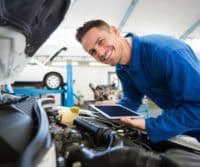
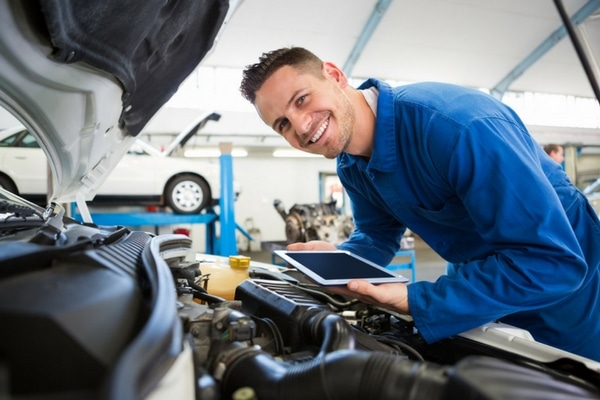
Are you burning through tanks of gas faster than you used to? Finding it harder to speed up to get around the nice old lady going 35mph on the highway? Having issues with your engine sputtering when you slow down? When was the last time you had your fuel injectors looked at? Keeping your fuel injection system well-maintained is one of the keys to better fuel performance for your car and a longer life for your engine.
Your car’s fuel injection system consists of two primary parts: the fuel injectors and the fuel pump. The fuel pump sends pressurized fuel from the gas tank to the car’s engine bay. The injectors then distribute the fuel to different cylinders within the engine as a fine spray. Your spark plugs ignite the spray from the injectors, powering your car.
Computers control modern fuel injection systems, replacing the manual carburetors found in most cars built before 1990. Carburetors required time to warm-up before the car was ready to drive. Modern systems improve upon this performance by allowing cars to start up right away without needing this warm-up period, even in cold weather.
Fuel injection systems also improve the fuel efficiency of your car. A well-maintained system limits the amount of gas needed to power the car, giving you better mileage for every tank of gas. They also make less noise than old carburetor-powered engines and lead to less engine maintenance as your car parts last longer in this type of system.
There are two primary ways to clean and maintain fuel injection systems:
These are a less-intensive way of cleaning injection systems. Nothing is taken apart or removed; instead, cleaners are introduced to remove contaminants from the system.
The injectors get removed from your car entirely and cleaned with special ultrasonic tools. They’re then tested to ensure that the flow rate and spray pattern are within acceptable limits. Technicians also check for possible leaks before putting the injectors back into your car.
You suck in dirt and other contaminants every time you drive your car. Over time, those contaminants get into your engine. When too much of it gets pulled into your injector and fuel pump, your car begins experiencing problems including:
Continued failure to maintain your car’s fuel injection system often leads to major damage to your engine, costing you a lot of money in repairs.
Think you might have an issue with your car’s fuel injection system? Contact Ace Auto in West Jordan, Utah today and schedule a review of your injection system. We’ll make sure your engine runs as efficiently as possible. Give our master mechanics a call today at 801-447-1693 for a free quote on your next service!


With summer on its way, it's time to start thinking about readying your car for the heat and all its glorious travel opportunities. With a little preparation, you can be ready for a spur of the moment weekend getaway, and have the confidence that your car will get you there and back safely.
Winter weather can be hard on tires. This is a good time of the year to do a quick check on your tires. This should include inspecting the tread and verifying proper inflation. Poorly inflated tires impact grip which makes driving feel more erratic, can reduce your overall miles per gallon, and can even lead to a tire blowout. Always check tire pressure with a calibrated tire pressure gauge.
If you live in an area that permits snow tires, now is a good time to change them out for your standard warm weather tires. Also, check up on your spare. Make sure one is present, the correct spare for your ride, and that you have the tools to put it in should a tire blow. Nothing is quite as awful as discovering a missing jack at 3 am with a blown tire in the middle of nowhere.
Oil is another area that sometimes gets overlooked. Check the oil and adjust to suit the needs of your car. Your owner's manual for your car will list recommendations for your climate. Warm oil is thin oil, and oil that is not thick enough won't provide the lubrication necessary to keep your engine in good working order. If a dealership or garage does your oil change, ask after the viscosity of oil they are using to double check it’s the right version for your needs.
Overheating is a primary cause for summertime breakdowns. One great method to reduce the risk of this is to keep on top of your coolant maintenance. Your radiator should be flushed completely and refilled every other year and you should check the level, general condition, and concentration of the coolant once in a while between replacements. If you do the flushing yourself, dispose of the old coolant properly; it has a sweet taste that dogs love and it is highly toxic.
You want to keep an eye on your transmission fluid levels as well. Too much or too little, and you will run into problems that can, over time, lead to costly repairs. Further, make sure you read your manual to determine the correct mix of transmission fluid for your car. The SAE number found there will determine the right ATF mix.
Signs of too much transmission fluid:
Signs of too little transmission fluid:
On a swelteringly hot day, you want your A/C in good working order. If it's not blowing a nice frigid blast through your car, you likely are in need of additional refrigerant. Ace Auto Repair can help charge your A/C if it's not keeping you nice and cool.
As they say, an ounce of prevention is worth a pound of cure. Don't get stranded this summer on the side of the road with a smoking car. Bring your car into Ace Auto Repair in West Jordan, Utah for a summertime inspection, and we will check every element of auto maintenance listed above. Avoid summertime sadness and give your ride the basic service it requires to keep you on the road.
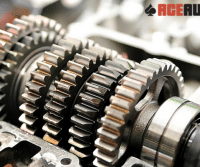
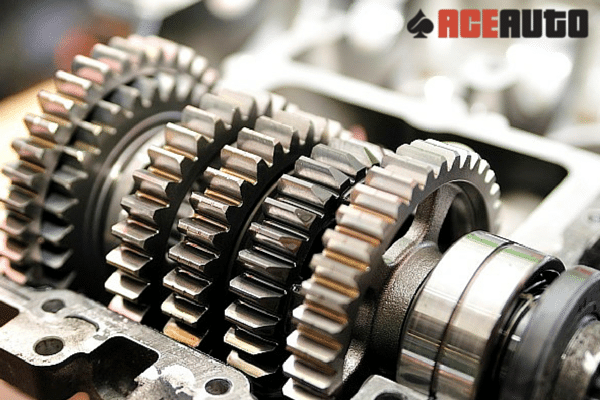
A slipping transmission is a sign that your vehicle needs maintenance or repair. It is not always a sign that the transmission is failing, but a slipping transmission should never be ignored. We’ve compiled some basic signs and symptoms of a transmission slip, as well as what to do if your transmission is slipping.
To figure out if your transmission is slipping, it helps to understand the purpose of a car’s transmission and a little bit about how it works. The transmission transfers the energy produced by the car’s engine to the wheels. The internal combustion engine of your vehicle creates power and the transmission converts that power into torque, or rotational energy. The torque is then conveyed to the axles and rotates the wheels.
When a transmission slips, it is not properly transferring the energy from the engine to the wheels. It may feel like the vehicle is slow to respond, or does not respond at all when you press the gas pedal. Or it could feel like your car changes gears suddenly without any apparent reason.
It is not always easy to diagnose a slipping transmission. There are a few common signs that you should definitely not ignore. Some of the more commons signs of a slipping transmission include:
A transmission can slip for several different reasons and some of the causes are far easier to fix that others. For example, a clogged transmission filter, low transmission fluid, or even burnt transmission fluid can all cause a transmission to slip and are not that difficult to fix. You’re looking at a more severe problem however if the transmission slips as a result of worn or broken transmission gears or bands.
Since low or ineffective transmission fluid is a likely cause of a slipping transmission, it can make a world of difference to do a transmission flush. This is when an ASE-certified technician flushes the transmission with fresh transmission fluid and cleans the entire system. Any burnt or ineffective fluid is flushed out. A transmission flush can also get rid of any contaminants that may have been preventing the proper flow of transmission fluid.
There are transmission fluid additives available that can help, to an extent, with some transmission slipping. These additives can help to improve friction or remove varnish buildup in the transmission. They cannot repair damaged gears or other internal parts of your transmission. Additionally, you should not use any transmission additive that contains solvents. Solvents can cause the seals in your transmission to wear more quickly by lowering your transmission fluid’s lubrication.
If you have had a transmission flush and tried an additive to no avail, you may have a serious transmission problem. The clutch may need to be adjusted or replaced. The bands may need adjustment or replacement. The gears themselves may even need to be replaced. In any of the instances, the transmission must be dismantled to perform these repairs.
If you think your transmission is slipping, it is better to deal with it now than to wait until later. A transmission slip that can be resolved with a transmission flush today may require more costly repairs in the very near future. If you are around West Jordan, UT and have any signs of a slipping transmission, contact Ace Auto Repair today. We’ll help get you and your vehicle back in gear.

![]()


The cold weather is harsh on your car. In order to avoid expensive repairs – and dangerous accidents – check out what the sub-zero temperature can do to your car, and what you can do to help prevent problems.
A couple different things can go wrong with tires when cold weather strikes. First, tire pressure will vary according to temperature. A drop in temperature can cause your tires to quickly deflate – this is noticeable even when driving at night compared to driving during the day. Check your recommended tire pressure when the weather starts to get chilly. Also keep in mind that many tires are still made with rubber materials, and these materials will harden when the weather gets cold. This can cause tread and gripping problems in all-season tires. Winter tread tries are designed to resist this problem with alternative materials – another good reason to consider switching to winter tires.
When the weather gets seriously cold, your battery may struggle to operate correctly. This is caused by low temperatures interfering with the way that a battery operates and in some cases actually leeching away voltage, reduce the charge that a battery has to get a car started. The last thing you want in the middle of winter is to go out and find your car has a dead battery. There are several ways to avoid this problem. In the coldest areas, consider using available car heats. Make sure your battery is not too old – most batteries are in their peak condition for around 3 years. When the temperature starts dropping below zero, try to keep your car in a garage as often as possible.
While most of the fluids in your car have additives to keep them from freezing, this doesn't mean they aren’t affected by freezing temperatures. When the weather gets cold fluids grow sluggish, thickening and moving more slowly. This is most dangerous when it comes to transmission fluid, which needs to move effectively to manage car performance. However, sluggish brake fluid can also be disastrous. Even oil can thicken and struggle to perform. Check your fluids and replace or top off as needed.
Click here to read 5 Cold Weather Car Myths
Your engine really doesn't like cold weather. It will struggle to run efficiently when the temperature drops below zero, using a lot of gasoline very quickly to keep itself from stalling. Not only does this lower efficiency, but it also causes the build-up of water vapor. This is especially noticeable if you only run your engine for half an hour or so at a time. Try leaving your car running to stabilize your engine and get rid of accumulated water vapor. Heaters will also sap heat away from your engine, so avoid immediately turning on your heater when starting your car.
For the same reason that batteries tend to struggle in cold weather, spark plugs may also be in danger. Electricity simply does not fare well in cold, dry condition, and older spark plugs will only make conditions worse. So, before the coldest weather starts, check out your spark plugs for any sign of corrosion or age and replace them if necessary.
Windshields are very durable in modern cars, but some windshields may still be in danger of cracking, especially when mistreated in cold weather. Use the right kind of coolant, never wash with hot water in cold weather, and take special care of your wipe blade so that they don't freeze to your windshield. This can be aggravated if other cars are kicking up a lot of slurry into your windshield, especially slurry made with rock salt or similar components.
Older or more delicate engines may also be in danger of cracking if the engine block is vulnerable to sub-zero temperatures and your coolant is contaminated or inferior. Keep that coolant topped off and use the recommended formula!



Ace Auto Repair knows how the cold affects vehicles, and are conveniently located in West Jordan, Utah, and serves the surrounding areas. If you are need of engine repair or need a diagnosis, contact Ace Auto Repair today! We work on all makes and models of cars, trucks and SUV's. We are family owned company, and pride ourselves on being honest auto repair professionals.
Recent Comments